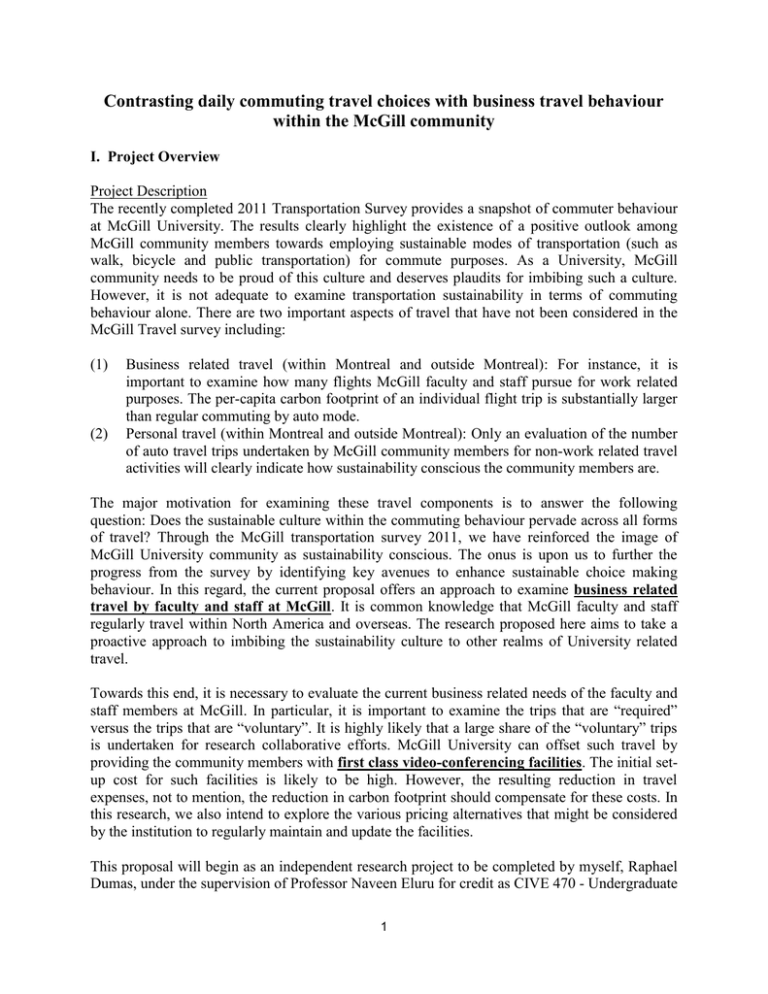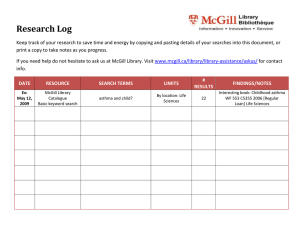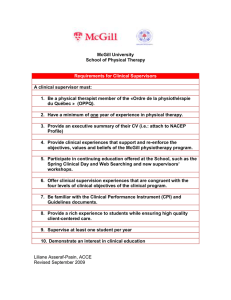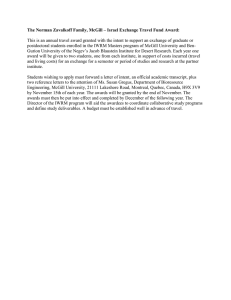Contrasting daily commuting travel choices with business travel behaviour
advertisement

Contrasting daily commuting travel choices with business travel behaviour within the McGill community I. Project Overview Project Description The recently completed 2011 Transportation Survey provides a snapshot of commuter behaviour at McGill University. The results clearly highlight the existence of a positive outlook among McGill community members towards employing sustainable modes of transportation (such as walk, bicycle and public transportation) for commute purposes. As a University, McGill community needs to be proud of this culture and deserves plaudits for imbibing such a culture. However, it is not adequate to examine transportation sustainability in terms of commuting behaviour alone. There are two important aspects of travel that have not been considered in the McGill Travel survey including: (1) (2) Business related travel (within Montreal and outside Montreal): For instance, it is important to examine how many flights McGill faculty and staff pursue for work related purposes. The per-capita carbon footprint of an individual flight trip is substantially larger than regular commuting by auto mode. Personal travel (within Montreal and outside Montreal): Only an evaluation of the number of auto travel trips undertaken by McGill community members for non-work related travel activities will clearly indicate how sustainability conscious the community members are. The major motivation for examining these travel components is to answer the following question: Does the sustainable culture within the commuting behaviour pervade across all forms of travel? Through the McGill transportation survey 2011, we have reinforced the image of McGill University community as sustainability conscious. The onus is upon us to further the progress from the survey by identifying key avenues to enhance sustainable choice making behaviour. In this regard, the current proposal offers an approach to examine business related travel by faculty and staff at McGill. It is common knowledge that McGill faculty and staff regularly travel within North America and overseas. The research proposed here aims to take a proactive approach to imbibing the sustainability culture to other realms of University related travel. Towards this end, it is necessary to evaluate the current business related needs of the faculty and staff members at McGill. In particular, it is important to examine the trips that are “required” versus the trips that are “voluntary”. It is highly likely that a large share of the “voluntary” trips is undertaken for research collaborative efforts. McGill University can offset such travel by providing the community members with first class video-conferencing facilities. The initial setup cost for such facilities is likely to be high. However, the resulting reduction in travel expenses, not to mention, the reduction in carbon footprint should compensate for these costs. In this research, we also intend to explore the various pricing alternatives that might be considered by the institution to regularly maintain and update the facilities. This proposal will begin as an independent research project to be completed by myself, Raphael Dumas, under the supervision of Professor Naveen Eluru for credit as CIVE 470 - Undergraduate 1 Research Project as part of my undergraduate curriculum in the department of Civil Engineering and Applied Mechanics at McGill. The project is envisioned to continue further even after my graduation. As part of my course, I will design a small survey that simultaneously captures the information on business-related travel including frequency of travel, expected travel distance, mode of travel and nature of the trip (required or voluntary). Based on this information, I will quantify greenhouse gas emissions from work-related travel and contrast them with daily commute greenhouse gas emissions on an individual basis. The target sample size will be around 200-300 faculty members surveyed with the help of a research assistant hired through the Sustainability Projects Fund. In the subsequent stages of the project, two main research activities will be conducted to complement the findings of my work: (1) (2) A database on every single business trip conducted by faculty and staff in a recent year will be compiled with the help of the McGill Sustainability Office. This database will be used to compute the total greenhouse gas emissions of business-related travel at McGill and will be contrasted with the carbon footprint of commuting trips (already estimated as part of the recently completed Travel Survey) A select set of faculty will be surveyed to identify the different incentive structures to reduce business travel among faculty and staff. The research team will develop a stated preference survey that will provide the University with quantitative estimates of the various “trade-offs” that McGill community members are willing to consider in reducing their business travel. Project eligibility Very limited research has been conducted so far on inter-city travel, let alone business travel. The transportation research community has mostly been concerned with understanding daily travel choices and has given little attention to business travel. From a purely research perspective, there is a need to turn our attention to this increasing portion of travel, especially in an academic setting, in light of the rising needs for interdisciplinary research and hence growing international collaborations. At McGill, there is no analysis currently of the greenhouse gas emissions from work-related trips. Nor are there adequate facilities for video-conferencing or a sustainable vision for workrelated transportation. This project aims to address these issues in order to provide recommendations on ways to reduce business travel through investments in information and communication technologies. Undergraduate research in engineering at McGill requires improved accessibility and visibility. This project tackles these issues in two ways. First it provides an employment opportunity and entry-point for a junior undergraduate who may not have the connections and knowledge to design and implement an independent research project. Second, by disseminating the results and showing their applicability to the McGill community it will encourage other engineering students to seek out other opportunities for research that can benefit McGill. 2 Timeframe/Milestones January 2012, Survey Design February 2012, Data Analysis March 2012, Generate GHG emissions April 2012, Document and report analysis results Stakeholders I will be directly supervised by Dr. Naveen Eluru, assisted by Dr. Marianne Hatzopoulou (letters attached). II. Project Implementation Type of Activity – Task Design Survey Estimated Time Required 25 hours Disseminate Survey Compile survey data Analyze survey data Generate GHG emission estimates Prepare a Poster Summary Report 12 hours 10 hours 15 hours 25 hours 5 hours 20 hours Group Member in Charge Raphael, Dr. Eluru and Dr. Hatzopoulou Raphael Raphael Raphael Raphael Raphael Raphael III. Financials (Critical Date February 2012) Detailed expenses: Expense Description Research Assistant who will assist Raphael in survey management and prepare survey participation gifts Poster preparation Detailed revenues: Revenue Source Sustainability Projects Fund Estimated Cost $1,600 $150 Amount Requested $1,750 Confirmed? No 3 IV. Additional information As noted in the project description, a full estimation of McGill’s carbon footprint for businessrelated travel including a set of recommendations for reducing such travel needs by providing alternatives, is beyond my independent research project. At the end of the winter term and based on my project, the following findings are expected: - - An understanding of the relationship between business-travel choices and daily commuting choices; thus capturing behaviours such as “I walk to work but I fly every month”. This will help further the research on travel choices and improve our understanding on whether business travel choices are made with the same “beliefs” as daily commuting choices An estimation of greenhouse gas emissions from business travel and daily commute on an individual basis (for the survey sample) A set of recommendations on “general profiles” for McGill faculty who would be the most prone to reduce their travelling provided viable alternatives are available Drs. Eluru and Hatzopoulou, along with other faculty members at McGill, are interested in pursuing this work through a research project that will specifically: - Compute the carbon footprint of all McGill business travel Quantify the trade-offs that McGill community members are willing to consider in reducing their business travel. This will enable the research team to provide much more focused policy recommendations to the McGill Sustainability Office. 4


